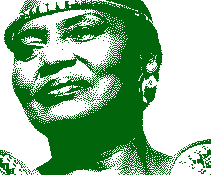
|

|
 |
|
AfroDisc: May 2000 Blasting Out of the Ghetto With the release of Joko (Sony), Senegalese singer Youssou N'Dour has ended a four-year drought that saw little action from the usually outgoing performer. However, if you are looking for a classic mbalax album, you will be disappointed. This album defines a new direction for the man who helped pioneer the distinct mbalax sound through much of the 1980s and 1990s. Half the songs on the new album are written in English and N'Dour downplays the mbalax sound, blending it into more westernized urban roots, R&B and rap sounds. But the writing is sweet and clever, allowing rap-meister Wyclef Jean to inject some 'hood' vocals while N'Dour weaves the exotic Wolof tongue into the mix. The result is a superb rap potpourri on the tracks "How Come" and "Birima (remixed)." But, somebody will likely ask how a track like "Don't Look Back" could possibly be African. That, however, is the whole point of the album. N'Dour, like other young African artists (Geoffrey Oryema, Angelique Kidjo, Lokua Kanza, et cetera) who have tasted international ambience, is tired of playing the ghetto called "African music." Here, he opts for music that is much larger, and I dare add, aimed at the appreciative and sophisticated world music listener. Joko is the offspring of that aspiration. That said, N'Dour lets fly a few colorful mbalax arrows on the tracks "Beykat," "Liggey" and "Mouvement," all of which give more space for the sharp tama to romp freely. Elsewhere N'Dour displays more mellowed vocals, accompanied by a well-balanced instrumentation. He threads softly on "My Hope Is In You," a song reminiscent of "7 Seconds" with Neneh Cherry, only much deeper in shade. He gets supporting roles from Sting on the track "Don't Walk Away" and Peter Gabriel on the track "This Dream." All of which goes to prove that the mbalax prince has not lost the touch, only become wiser with age.
This review is of the European release. The Queen Mother of African Music Answers One More Curtain Call Miriam Makeba, the proud queen of South African jazz through much of the 1960s and 1970s, has answered another curtain call with the album titled Homeland (Putumayo). But instead of making this the twilight album of a fading grand-diva, as suggested by the lyrics on the track "In Time," Homeland is a lively jazz variety album that incorporates the best in the tradition with knock-out vocals backed by superbly arranged horns, piano and drums. On Homeland, Makeba sings in both English and Zulu, creating a warm glow with her trademarked lilting voice. She breathes fire on the tracks "Mashakane" and her nostalgic signature song "Pata Pata." Best of all, Makeba demonstrates her undiminished vocal power on the pared-down, drums-only track "Liwawechi," and the jaunty piano piece "Umhome." "Lindelani," a spicy duet featuring Congolese minimalist Lokua Kanza, is sung in the Congolese native tongue of Lingala. In short, if Makeba intended this album to be her farewell before slipping away into the sunset, she may have proved the complete opposite; she still has what it takes to make sweet music. The hair may be grayer and the eyebrows crinkled, but the fire still burns bright as ever.
Youth Carry the Torch In African Pop Music Femi, the Son carries the legacy of Fela, the Father, on Shoki Shoki (Universal), and proves himself worthy of the Kuti name, a name that conjures images of music extravaganza of the 1970s, rebellion and political activism of the 1980s by the late Fela Kuti. The album is remarkably Fela-esque. The horns and drums are plentiful, the in-your-face and the politically-laced lyrics sung in pidgin English (a mix of Yoruba and English). But, Femi kicks things up a notch faster, and squeezes in the dancehall beat. The result is a very danceable album with a lot of energy to spare on "Truth Don Die," "Beng Beng Beng," and "Blackman Know Yourself." The major drawback for Shoki Shoki is that Femi tries too hard, overloading the system with too many sounds all at once. In so doing, he denies the listener a chance to sip in the music and not choke on it. That said, he shows a promising talent for song writing and arranging, sometimes with exciting results (listen to "Scatta Head"). Young as he is, he will learn in due time.
The most interesting thing about Mamadou's style (as opposed to the more classical brand practiced by Toumani Diabate) is the youthful zest for going off the beaten trail, embracing blues, jazz and hip-hop along the way before returning to his djeli roots. Listen to the tracks "Dagna" and "Donuya" to get the fullness of sound from the fingers of a kora apprentice who is going places.
Traditional Treasure from Burkina Faso
In any event, Saaba offers fast-paced drumming in which one central drum keeps a steady beat, while a host of instruments including the mournful Peuhl flute, provide colorful embellishment. (Do take time to listen to each instrument separately, and then the overall sound-effect to get a truly good dose of the wonderful flavor.) My favorite tracks include the jazzy, laid-back tracks "Konmana" and "Were Were To." But then, all of them are sweet treats for the ear. - Opiyo Oloya
Some titles are available at cdroots.com
|
Opiyo Oloya is the host of the radio program Karibuni on CIUT 89.5 FM Radio, Toronto. The show airs on Sunday, 6:00 PM- 8:00 PM. CUIT is now available via Real Audio G2 at www2.ciut.utoronto.ca
E-Mail: [email protected]

